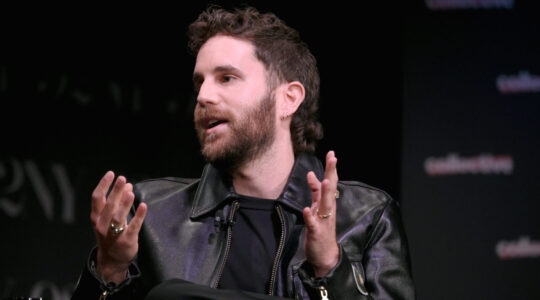With all the controversy over last night’s debate exchange about the connections between Louis Farrakhan and Barack Obama’s pastor, it’s worth reviewing what the candidate had to say about the topic during a meeting in Cleveland on Sunday with Jewish leaders. From the transcript provided by the Obama campaign:
I am member of the Unity Church of Christ, Trinity United Church of Christ been there for 20 years. And although this is an improvement because you don’t think I am Muslim, which is the other… [laughter] You know so, slowly we are progressing here. It is a very conventional African American Church. If you go to, if you were there at the church you would be hearing gospel music and people preaching about Jesus. It is a very conventional in that sense. It is true that my Pastor, Jeremiah Wright, who will be retiring this month, is somebody who on occasion can say controversial things. Most of them by the way are controversial directed at the African American Community and calling on them start reading books and turn off the T.V. set and engage in self help. And he is very active in prison ministries and so forth.
It is also true that he comes out of the 60s he is an older man. That is where he cut his teeth. That he has historically been interested in the African roots of the African American experience. He was very active in the South Africa divestment movement and you will recall that there was a tension that arose between the African American and the Jewish communities During that period when we were dealing with apartheid in South Africa, because Israel and South Africa had a relationship at that time. And that cause – that was a source of tension. So there have been a couple of occasions where he made comments with relation, rooted in that. Not necessariary ones that I share. But that is the context within which he has made those comments. He does not have a close relationship with Louis Farrakhan.
Louis Farrakhan is a resident of Chicago and as a consequence he has been active in a range of community activities, particularly around ex-offenders and dealing with them. I have been a consistent, before I go any further, a consistent denunciator of Louis Farrakhan, nobody challenges that. And what is true is that, recently this is probably, I guess last year. An award was given to Farrakhan for his work on behave of ex-offenders completely unrelated to his controversial statements. And I believe that was a mistake and showed a lack of sensitivity to Jewish community and I said so. But I have never heard an anti-Semitic made inside of our church. I have never heard anything that would suggest anti-Semitism on part of the Pastor. He is like an old uncle who sometimes will say things that I don’t agree with. And I suspect there are some of the people in this room who have heard relatives say some things that they don’t agree with. Including, on occasion directed at African Americans that maybe a possibility that’s just – I am not suggesting that’s definitive.
So the point I make is this that I understand the concerns and the sensitivities and one of my goals constantly in my public career has been to try to bridge what was a historically powerful bond between the African American and Jewish communities that has been frayed in recent years. For a whole variety of reasons. I think that I have served as an effective bridge and that’s the reason I have overwhelming support among the Jewish community that knows me best, which is the Jewish community in Chicago. And I think that anybody who has friends among the Jewish community in Chicago should check out those credentials. But I do appreciate the opportunity to clarify those concerns. And as I said that last point I would make is that you know my Pastor is going to be retiring over the next month. So my general view, and the reason that I raise this, this is always a sensitive point, what you don’t want to do is distance yourself or kick somebody away, because you are now running for President and you are worried about perceptions, particularly when someone is basically winding down their life and their career. Okay, yes.
JTA has documented Jewish history in real-time for over a century. Keep our journalism strong by joining us in supporting independent, award-winning reporting.





